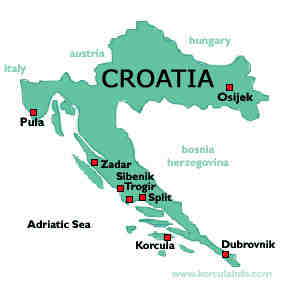Easter tourism a barometer for Croatian economy, government
 Zagreb - In the midsts of the global economic meltdown, tourism-dependent Croatia is anxiously awaiting the first results of the Easter holiday break. With holiday-makers to the former Yugoslav republic providing nearly a quarter of the country's GDP, tourism figures aren't just of interest to the hotel and catering trade - they could well affect the prospects for the government in Zagreb.
Zagreb - In the midsts of the global economic meltdown, tourism-dependent Croatia is anxiously awaiting the first results of the Easter holiday break. With holiday-makers to the former Yugoslav republic providing nearly a quarter of the country's GDP, tourism figures aren't just of interest to the hotel and catering trade - they could well affect the prospects for the government in Zagreb.
Even though first signs show high visitor numbers and packed hotels, any relief is tempered by the knowledge that the year ahead will still be tricky.
Official statistics are not available yet, but it is clear that the numbers of holiday-makers exceeded some of the bleaker forecasts from experts - including the government's own Tourism Minister, Damir Bajs.
Bajs predicted a 3 per cent decline in visitor numbers for 2009. Others went further, with the head of the national hotel owners organisation, Franko Palma, predicting a double-digit drop.
Despite the good showing over the Easter weekend, he cautions against too much optimism.
"Last year Easter fell earlier in the season and the weather was nasty, so it isn't clever to jump to a conclusion that growth for Easter this year is a real signal," Palma said.
Palma said the crunch periods were the so-called black holes of May, and late August to early September.
There is much riding on it. Indeed, the success or failure of the tourist season may actually be the hottest political question in the country.
Tourism is Croatia's biggest income-earner and a bad season could force Prime Minister Ivo Sanader's cabinet into a second emergency budget in the autumn and to request credit from the International Monetary Fund - both of which would be unpopular measures.
With around 9.5 billion dollars last year, tourism generated 22 per cent of the Croatian gross domestic product (GDP), more than any other sector of the economy.
In its best ever year, 2008, around 10.6 million tourists came to Croatia, mostly staying along its beautiful, 1,100-kilometre Adriatic coast.
One in five of all tourists were from Germany, with Austria and Slovenia close behind, with in total 54.6 million nights being spent in Croatia by tourists.
Croatia's tourism sector has grown and gone up market to match the influx, with seven 5-star hotels and 67 4-star hotels springing up in the past two years alone.
After a long boom, predictions of 3 to 11 percent drops in revenue have created waves of panic in the industry.
The government responded with a series of measures to boost tourism, not least a 14.5 million dollar advertising campaign in strategic markets.
It even advertised in its former Yugoslav sister republics, Serbia and Bosnia, with whom relations are prickly.
Another part of the government's emergency action plan was to scrap entry visas for visitors from the emerging markets of Russian and Ukraine, scrapping entry charges for some museums, and employing famous athletes and celebrities to promote Croatia as "tourism ambassadors."
In a sign of the straightened times, old Russian jet aircraft, long-since banned from Croatian airports because they are too noisy for EU - which Croatia is due to join - will again be landing this summer, as they bring in spending guests.
Despite all this, the real fortunes of the critical Croatian tourism industry will only be known at the end of the season.
"It started well, but the finish is more important," a columnist with the internet portal Net concluded. (dpa)